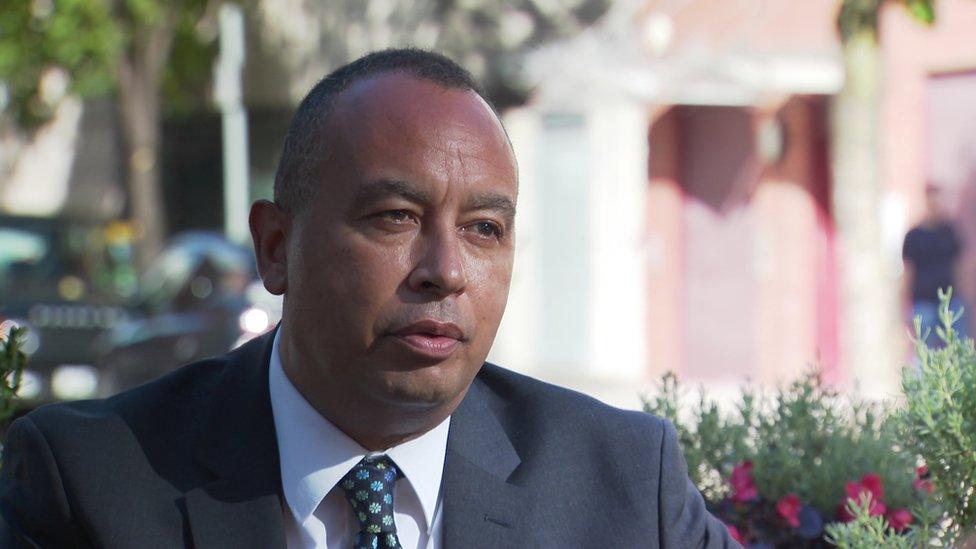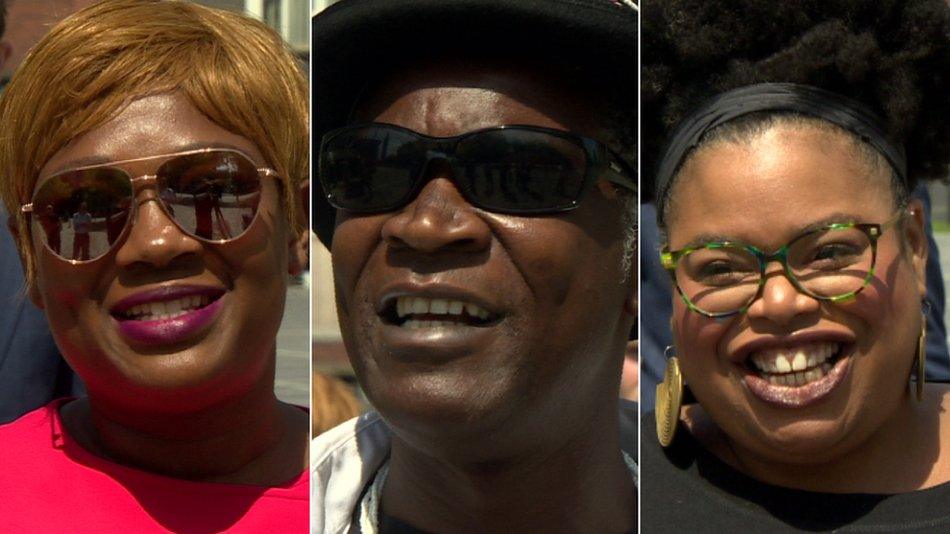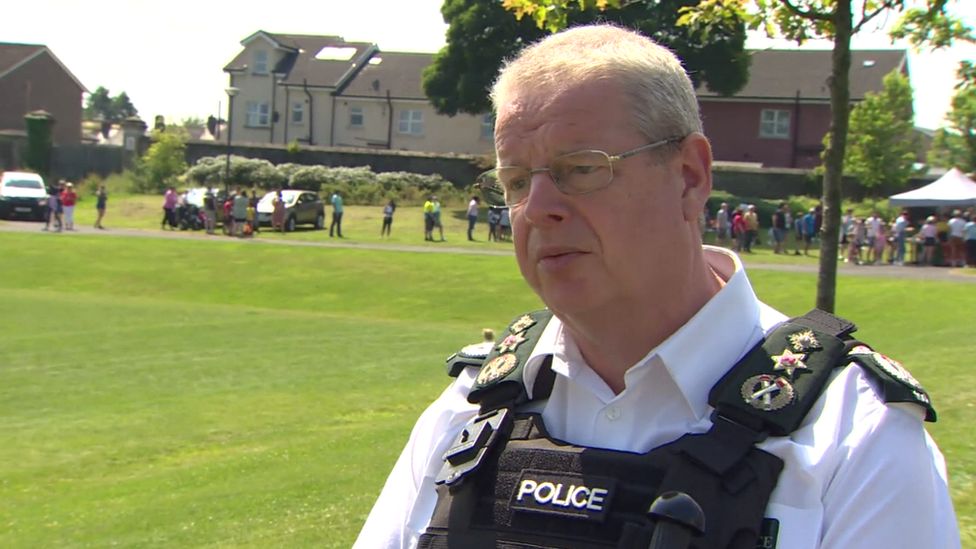BLM protests: PSNI officer says policing was 'hurtful'
- Published

Protesters gathered in Custom House Square in Belfast on 6 June last year
The Police Service of Northern Ireland's handling of Black Lives Matter protests was "difficult and hurtful", says a serving officer.
Some 70 fines were issued at Belfast and Londonderry protests in June 2020.
No fixed penalty notices were issued at a Protect our Monuments rally in Belfast in the same month.
Last December, the chief constable apologised after findings by the Police Ombudsman said the handling of the protests was unfair and discriminatory.
Insp Richard Williams, the first PSNI officer from an ethnic minority background to speak publicly about the issue, said it had "shattered trust and confidence" in the PSNI.
"I found it very difficult. I've been in the organisation for many years and I sort of lost a sense of belonging," he told the BBC's The View programme.
"The approach that it took in terms of pursuing, somewhat aggressively, people who were just practising their human right to protest, that was quite hurtful.
"It did send out a message that maybe the organisation didn't care about things that mattered to me.

Insp Williams joined the RUC in 1994
"Whereas when we saw the Cenotaph protest they didn't hand out any tickets, that was a different optic lens.
"Maybe that is what mattered more the them, that community rather than the ethnic minority community.
"The police doesn't belong to anybody, it belongs to everybody and it's very important that the messaging goes out to all communities that the police act in an even-handed manner to all communities.
"That didn't seem like it was even-handed."
Insp Williams said Chief Constable Simon Byrne's subsequent apology had been welcomed by ethnic minority communities.
"He's done great work in building that trust and confidence in ethnic minority communities," he added.
"The very fact that people came out and protested at Black Lives Matter, Northern Irish people came out and protested, black people, white people, across the board, I found it very welcome.
"It gave me a sense of belonging that people in this country cared about the things that I cared about.
"I joined the police to help protect the people of Northern Ireland, I was blown up in explosions, I put my life on the line and I felt the people had given back in terms of coming out and caring about things that mattered to the ethnic minority community.
"But that was in sharp contrast to the way the police acted in their approach."
Allow X content?
This article contains content provided by X. We ask for your permission before anything is loaded, as they may be using cookies and other technologies. You may want to read X’s cookie policy, external and privacy policy, external before accepting. To view this content choose ‘accept and continue’.

In June, it was announced that 14 people who had been referred to the Public Prosecution Service for potential breaches of Covid-19 regulations at the events in Belfast and Londonderry would not be prosecuted.
The following month, Simon Byrne acknowledged relationships between the PSNI and black and ethnic minority groups had been damaged.
He said that despite the PSNI's "best efforts and intentions", things had gone wrong and trust needed to be rebuilt.
On Friday, PSNI Ch Supt Gerry McGrath said the force's "approach to policing the Black Lives Matter protests in June 2020 unintentionally damaged the confidence and trust of the Black, Asian and minority ethnic community".
"We have apologised for the anger, upset and frustration caused by our policing operation, which has been reviewed by the Police Ombudsman and the NI Policing Board," he said.
"Although a further ombudsman's investigation is ongoing, we are working to implement the lessons learned and are engaging with our colleagues and those affected communities to rebuild a deficit of trust.
"For officers and staff, in conjunction with the Ethnic Minority Police Association and others, we are running four themed events to both celebrate Black History Month, and broaden our thinking about the term racism as it is experienced within communities, institutions and wider society as a whole."
Changing demographics
Insp Williams told the BBC the police service needed to better reflect the changing demographics in Northern Ireland.
About 0.5% of the PSNI's work force, and 41 out of 7,000 officers, come from an ethnic minority background
Ch Supt McGrath said that increasing presentation of BAME police officers was "a focus" for the PSNI.
In 2005, the PSNI set up the Ethnic Minority Police Association (EMPA) to focus on equality and anti-discrimination issues and to look at how it could achieve a more reflective and inclusive workforce.
"The number of woman in the organisation has changed, the number of Catholic officers has changed as well," said Insp Williams.
"But in terms of ethnic minorities, it hasn't really changed much and I would question why that is.
"There has to be some movement and process to help encourage people from ethnic minority communities which are growing in Northern Ireland to join.
"But part of that is getting the organisational culture right, making sure the organisation's a good place for them to be.
"The organisation must make sure it's operating and exists within that holistic sphere of making sure there aren't more black people stopped than others.
"That when we go to hate crime incidents, or deal with people from ethnic minority backgrounds, we're not checking their immigration status."
Insp Williams, who is English, joined the Royal Ulster Constabulary in 1994.
"I would rather have joined and did join the Royal Ulster Constabulary rather than join any of the English police forces at the time," he said.
"Because what has now become termed institutional racism was very apparent and that wasn't apparent within this organisation."
But he said the PSNI needed to be more inclusive and supportive.
"Any time there's been any sort of racist incident I've had support from colleagues," he said.
"In terms of the organisation, in terms of getting its policies correct, in terms of giving that support - that has not been as forthcoming through the years.
"We need to look at the progression of ethnic minority people through the organisation, the highest rank is currently an inspector.
"It's diversity of opinion that is going to progress and improve this organisation.
"It's well documented that diverse organisations perform better.
"People need to see more people who look like them on the streets policing to encourage them to joining the organisation.
"I would encourage people to join, to bring about some of that change."
- Published22 December 2020

- Published2 June 2021

- Published24 July 2021
